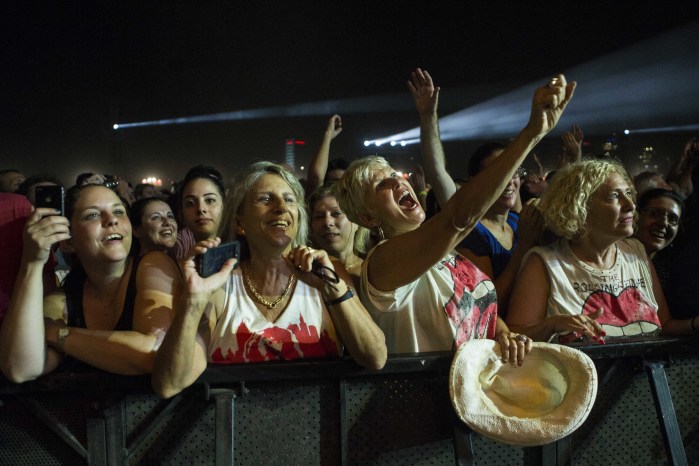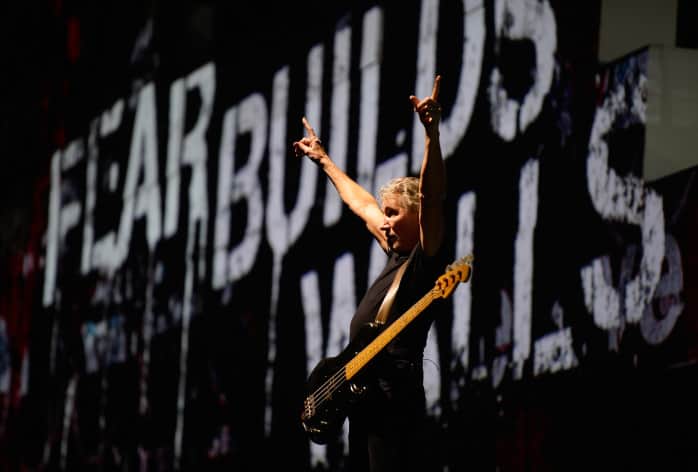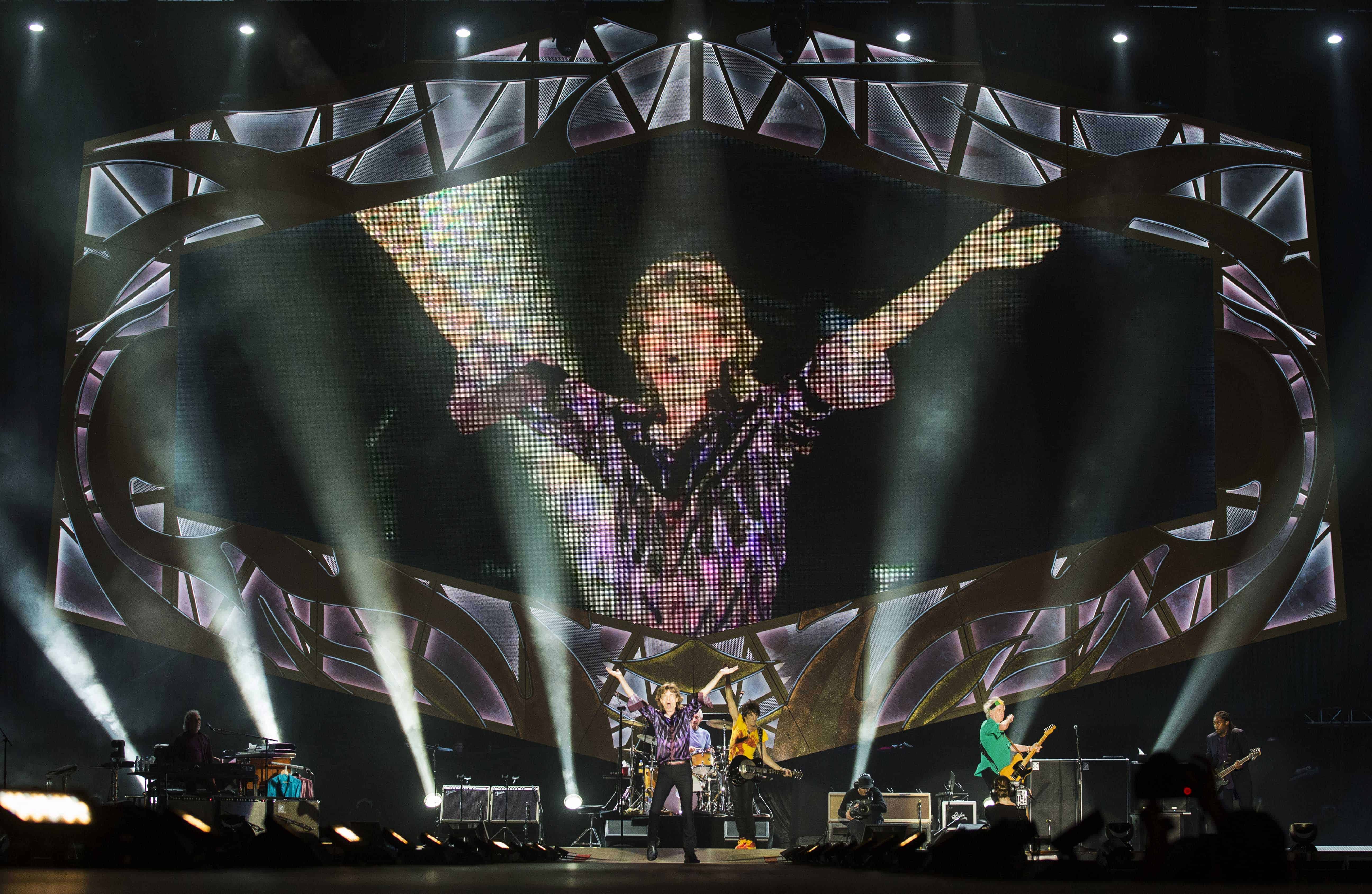JERUSALEM – Recently, the two surviving founders of Pink Floyd sent the rock band equivalent of a diplomatic cable — an open letter published in Salon — to the Rolling Stones. They asked Mick Jagger and his crew to cancel their first-ever concert in Israel to demonstrate solidarity with the Palestinian people and their struggle against occupation.
But Pink Floyd hit a wall.
The Stones not only went on with the show Wednesday night in Tel Aviv but delayed their opening by 45 minutes to allow devout Jews time to reach the concert after the end of the Jewish holiday of Shavuot, during which Orthodox Jews cannot drive, handle money — or press “Play” on the Stones’ “Exile on Main Street” album.
The Stones’ decision to ignore Roger Waters and Nick Mason of Pink Floyd underscored Israel’s growing popularity as a stop for major musical acts, and it signaled a setback for a campaign known as boycott, divestment and sanctions (BDS). The movement seeks to apply international pressure on Israel to end its military occupation of the West Bank, guarantee the right of Palestinian refugees to return to homes they fled or abandoned after 1948, and grant full rights and equality to Arab Palestinian citizens of Israel.
The BDSers are employing tactics similar to those used against the apartheid regime in South Africa a generation ago. Since 2005, the movement has pushed individuals and institutions to sever academic partnerships, boycott products such as Golan wines and Dead Sea beauty products, and divest from Israeli companies.
Israel says it is the only fully functioning democracy in the Middle East, so it answers its critics by suggesting they boycott Syria or Iran. But the threat of BDS has rattled Israel. The movement has gained visibility on American and European college campuses, and it has also managed to inflict some financial pain — recently, the Dutch pension management fund PGGM, with assets of $200 billion, divested from five Israeli banks because of their stake in the occupied West Bank.
The BDS movement also scored global publicity — good and bad — when the charity Oxfam tussled with one of its celebrity ambassadors, actress Scarlett Johansson, after her paid endorsement for the Israeli carbonation machine SodaStream, whose manufacturer operates a factory in the West Bank.
But the campaigns to persuade musicians — some of the BDS movement’s most high-profile targets — to boycott Israel have been kind of a flop, if measured by who actually cancels a show and speaks out about it.
“As in the cultural boycott of South Africa, some bands put profit ahead of human rights and end up on the wrong side of history,” said Omar Barghouti, a Palestinian activist and co-founder of the BDS movement. Barghouti said the Rolling Stones are crossing “our boycott picket line and providing Israel with a fig leaf to hide its regime of oppression with.”
It is difficult to know how many bands have decided to forgo performing in Israel for financial reasons or other concerns. But only a relatively few well-known acts have publicly bowed out of performances over concerns about Israel’s treatment of Palestinians — and many of those cancellations occurred years ago. Some of the biggest names to renege include Elvis Costello and Carlos Santana.
“It’s been awhile since the BDS movement had any real success in the cultural arena, and it’s not for lack of trying,” said Adam Shay, a consultant for the group Creative Community for Peace, which is funded by music industry executives to fight boycotts against Israel.
Shay said, “I am not seeing a lot of chatter on the Internet and actions against the Rolling Stones,” who he said might be so huge as to be impervious to appeals. “I would say the higher the financial stakes, the lower the ideological considerations.”
The Rolling Stones charged $200 for a basic ticket.

When it comes to whether BDS is raising consciousness about the Israeli-Palestinian conflict or fraying Israeli nerves, that is harder to measure. Barghouti pointed to Prime Minister Benjamin Netanyahu’s mentions of BDS — 17 of them — in his March speech before the American Israel Public Affairs Committee, a pro-Israel lobby in Washington. The BDS founder said this represents “panic.”
For his part, Netanyahu was dismissive of the movement, saying some “gullible” people “actually do believe that BDS advances peace.” Netanyahu asked: “How could anyone fall for the BS in BDS?”
BDS or not, Israel is now a popular stop on the global pop market. Last month, Justin Timberlake played in Tel Aviv, although after he posted an Instagram photo of himself leaning against the Western Wall, he caught some flak for hashtagging it #Israel. The wall is in the Old City of Jerusalem, which is contested ground.
Timberlake tweeted, “The Holyland . . . What an experience. I will never forget this day.”
Other recent acts to play in Israel include Rihanna, who cavorted in the Dead Sea in a bikini and was dragged into a mini-scandal when an Israeli journalist reported that Rihanna sang, “All I see is Palestine.” She actually sang the original lyric: “All I see is dollar signs.”
Last year, BDS activist and novelist Alice Walker, the Pulitzer Prize-winning author of “The Color Purple,” sent R&B star Alicia Keys a public note saying, “It would grieve me to know you are putting yourself in danger (soul danger) by performing in an apartheid country that is being boycotted by many global conscious artists.”
Keys played in Israel in July, anyway.
Coming later this summer to Israel? Megadeth, Lana Del Rey, Neil Young and the Backstreet Boys, who have sold out three nights in July.
“BDS has caused no significant damage, and most of the leaders in the West are against it,” said Israeli Intelligence Minister Yuval Steinitz.

This year, before U.S.-brokered Middle East peace talks collapsed, Israeli Finance Minister Yair Lapid warned that even a limited boycott “will hit every Israeli citizen directly in his pocket.” Lapid cited an internal review that suggested Israel could lose billions in export revenue if the BDS movement kicked in.
In their appeal to the bands that have scheduled shows, the Pink Floyd partners argued that “playing Israel now is the moral equivalent of playing Sun City at the height of South African apartheid.”
But bands that previously canceled shows in Israel are now coming back. The alt-rock Pixies are scheduled to perform this month.
Anti-boycott Israelis say the group’s appearance is especially significant because in 2010 the Pixies joined the Klaxons and Gorillaz Sound System in canceling shows after Israeli commandos killed nine activists on a Turkish vessel that was part of a flotilla trying to break Israel’s naval blockade of the Gaza Strip.
© 2014, The Washington Post








